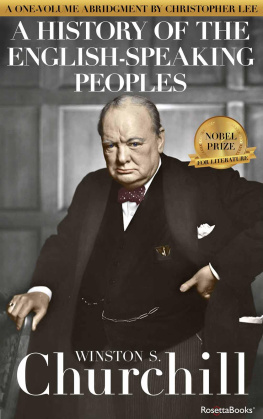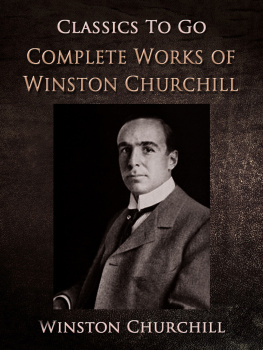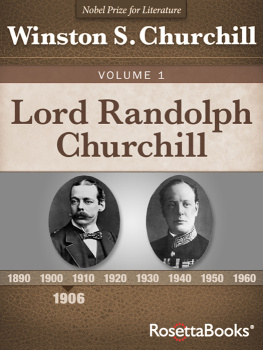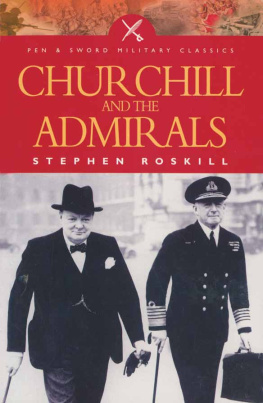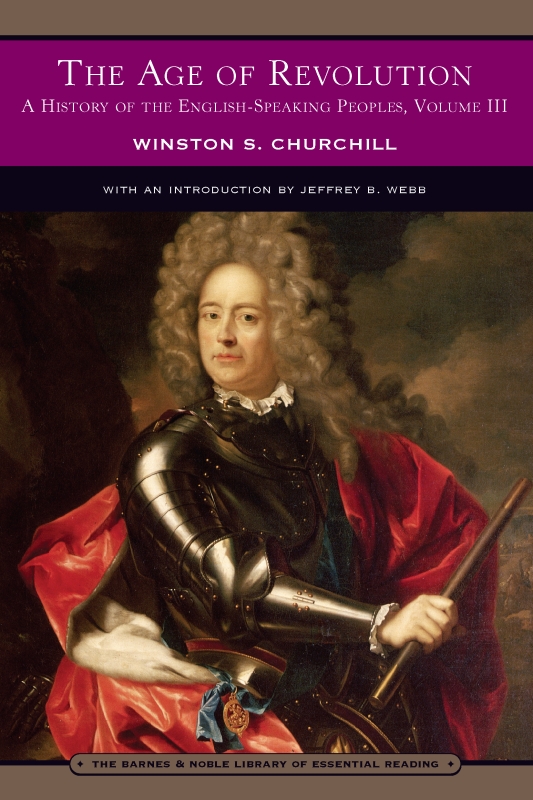
Table of Contents
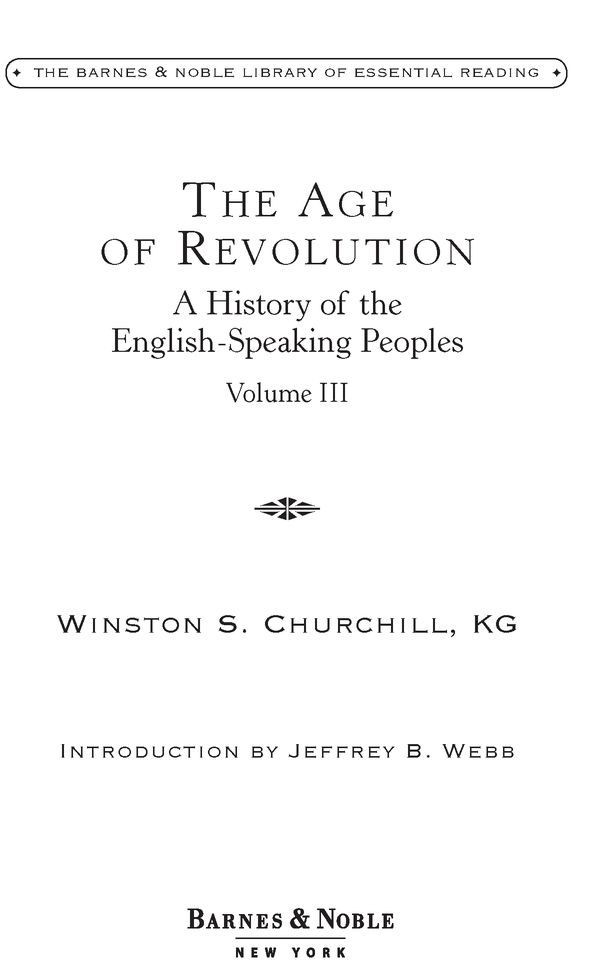
ACKNOWLEDGMENTS
I DESIRE TO RECORD MY THANKS AGAIN TO MR. F. W. DEAKIN AND Mr. G. M. Young for their assistance before the Second World War in the preparation of this work; to Dr. J. H. Plumb of Christs College, Cambridge, Mr. Steven Watson of Christ Church, Oxford, Professor Asa Briggs of Leeds University, Professor Frank Freidel, now of Stanford University, California, who have scrutinised the text in the light of subsequent advances in historical knowledge; and to Mr. Alan Hodge, Mr. Denis Kelly, and Mr. C. C. Wood. I have also to thank many others who have kindly read these pages and commented upon them.
In the opening chapters of this volume I have, with the permission of Messrs. George G. Harrap and Co. Ltd., followed the character of my Marlborough: His Life and Times (1933-38), summarising where necessary, but also using phraseology and making quotations.
INTRODUCTION
WINSTON S. CHURCHILLS A HISTORY OF THE ENGLISH-SPEAKING PEOPLES (4 vols., 1956-8) is the literary masterwork of the twentieth centurys greatest historical figure. Before the collection reached the press, Churchills stature as a writer was secure. He received the Nobel Prize in Literature in 1953, the same year he was knighted by Queen Elizabeth II. In the Nobel presentation speech, a member of the Swedish Academy wrestled with the problem of finding parallels to Churchills combined talents in writing and statecraft. Reaching for distant, and astonishingly lofty comparisons, author Sigfrid Siwertz thought of Churchill as a Caesar who also has the gift of Ciceros pen. Maybe Churchill would have been pleased to be associated with the mere mortals that populate this book, The Age of Revolution, volume three of A History of the English-Speaking Peoples. Beginning with Marlboroughs victory at Blenheim in 1704 and ending with Wellingtons defeat of Napoleon at Waterloo in 1815, Churchill recounts Britains rise to world leadership over the course of the eighteenth century. In this volume Churchill provides an excellent illustration of his unique literary voice, together with an introduction to his thoughts on the forces that shape human affairs. To read it is to savor something truly rare in literary history, a great book on a great subject written by a great man.
The contours of Winston Leonard Spencer Churchills early life suggest that he was destined for greatness. His childhood years were set against the backdrop of centuries of public service in the Churchill line, as with his distant kin, John Churchill, first Duke of Marlborough, the very soldier-statesman who dominates the opening chapters of this book. Winston Churchill was born November 30, 1874, to Lord Randolph Churchill and his American wife, Jennie Jerome. His parents thus personified a transatlantic connection that later shaped Churchills perspective on world events. But education came hard for Churchill, who struggled at his preparatory schools, including prestigious Harrow, before proceeding to the Royal Military Academy at Sandhurst. A military career followed, though Churchill combined his tours of duty with writing; his service in Cuba, India, South Africa, Sudan, and elsewhere resulted in newspaper articles for the Morning Post and Daily Telegraph, as well as books like The Story of the Malakand Field Force (1898), The River War (1899), and Savrola (1900). Churchill entered the House of Commons in 1900 and several years later aligned with the Liberal Party. In 1908, he met and married Clementine Hozier, who eventually bore him four daughters and a son. Churchill acquired his first important post when he became first lord of the Admiralty in 1912 in order to hasten naval preparations for the anticipated Great War, only to be fired for advocating the disastrous Dardanelles campaign of 1915. This began a long period of estrangement from national politics, with occasional party switching and short stints in cabinet-level positions. During this period he began work on A History of the English-Speaking Peoples, and published The World Crisis and the Aftermath (5 vols., 1923-31) in which he narrated the events of the Great War and assessed the post-war international situation. Because of this work, and his consistent voice for preparedness in light of the rising fascist movement in Europe, Churchill once again became first lord of the Admiralty (1939) and rose to Prime Minster the next year. Yet, Churchills unflinching leadership of the Allied coalition during World War II could not help the Conservative Party stave off electoral defeat in 1945. Churchill returned as Prime Minster in 1951, a position he held until poor health drove him from office in 1955. He died on January 24, 1965, and his gravesite is located at St. Martins Church in Bladon near his ancestral home and birth-place of Blenheim Palace, Oxfordshire.
Given his background, Churchill warmed quite easily to the subject matter of The Age of Revolution. It is a book of imperial ambitions and epic battles, broad-minded heroes and self-interested fools. Churchill met the challenge of these grand themes with true literary craft, occasionally rewarding the careful reader with the sublime. For example, he described the aftermath of Marlboroughs greatest victory as a time when Englishmen yielded themselves to transports of joy. Churchills talent assiduously matched language with its intended purpose. William of Orange possessed not mere courage, but a dauntless heart, and William Pitt called into life and action the depressed and languid spirit of England. Here Pitt doesnt merely inspire, he releases wellsprings of English virtue that few men could ever summon. As a writer, then, Churchill embodied the English ideal of subordinating form to function. Churchill was mindful of the destructive forces that threatened civilization in his own lifetimenationalism, industrialism, and fascism. It was his unshaken belief that the character of individual statesmen inoculated the nation against the dangerous effects of improper policy in the face of these challenges. This voice pervades Age of Revolution. Churchills intent is captured in his reference to an inscription on William Pitts statue in London: The means by which Providence raises a nation to greatness are the virtues infused into great men. Thus we have Marlboroughs serene, practical and adaptive character providing the antidote to the spirit of party vexing the court of William and Mary, which was aggravated by the vacillation of the Dutch, the treachery of the Pretender, and of course the perfidity of Louis XIV. The figures change throughout the narrative, but Churchills voice remains steady.
It is tempting to attribute Churchills authorial voice to his advantaged upbringing. Alexis de Tocqueville remarked that historians of aristocratic ages, looking at the worlds theater, first see a few leading actors in control of the whole play. Put simply, historys plot is driven by the actions and preoccupations of her great men. The chief historians of England before Churchills time possessed this vision. Churchill admired the work of Thomas Babington Macaulay, the gentleman-scholar who also wrote a multi-volume history, The History of England from the Accession of James the Second (5 vols., 1849-61). Actually, Churchill shared much in common with Macaulay, including privileged birth, tenure in the colonial service, election to Parliament, cabinet posts, and of course a passion for the history of the British Isles. One of Churchills biographers noted that as a schoolboy, he impressed his Harrow headmaster by reciting one thousand two hundred lines of Macaulays
Next page

